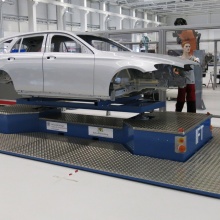In an increasingly demanding competitive environment, manufacturing companies must optimize their production structures. In order to optimally plan and control logistics and to react effectively to temporary and short-term changes, various types of information about products, processes and resources are essential. However, not only do these changes affect production, they also affect the required material supply in logistics. Within the research area of changeable production logistics, we are involved in industrial projects in the research and development of new control, safety and logistics concepts. This is where a network connection of all system components plays a very important part.
Networked logistics and logistics concepts
The IFT is working with cooperation partners from industry and research as part of the project "Fluid Vehicle Production for the Mobility of the Future ("FluPro")” at the research plant ARENA2036 (Active Research Environment for the Next Generation of Automobiles) on the development of new logistics concepts, in which the traditional separation between production and logistics within the networking of intralogistics components must be eliminated.
If necessary, the individual logistics components can be combined in cyber-physical systems with other production components to build ad hoc cyber-physical production systems. Furthermore, various intelligent load carriers are being developed within the scope of this project, which are able to transmit process information such as temperature, humidity or localization data thanks to integrated sensors and actuators. The logistics concepts to be developed as part of the research project are considered and evaluated from an economic point of view, so that new business models for logistics can be developed.
Control concepts
Control principles are also of major importance in the context of changeable production logistics, especially because of short-term decision making between all the available options. In this subject area, the IFT works on the development and testing of control concepts, with the help of simulation tools, e.g. the effects of control mechanisms.
As part of a research project that deals with decentralized control structures, control strategies are being developed and investigated to make the decisions of a production logistics systems in line with individual corporate goals.
Safety concepts
Turning rigid structures into flexible processes can generate major changes in production: For example, automated guided vehicles (AGVs) should no longer follow a defined path and should be able to move in a free and flexible way. Since people and AGVs work very closely together, or even interact with each other, in industry, new safety concepts involving AGVs should be implemented in the long term.
As a part of the project “Safety sensors for service robots in production logistics and other applications” (S³), the IFT is working in cooperation with several partners on a secure 3D environment for the employment of mobile robots. As well as enabling a secure 3D environmental monitoring, this sensor technology is intended to implement other functions such as the distinction between people and inanimate objects and the detection of irregularities. Through this project, the IFT is acquiring competences in the areas of: security, sensors and ROS (Robot operating systems).
Contact

Ali Bozkurt
M.Sc.Networked Logistics



